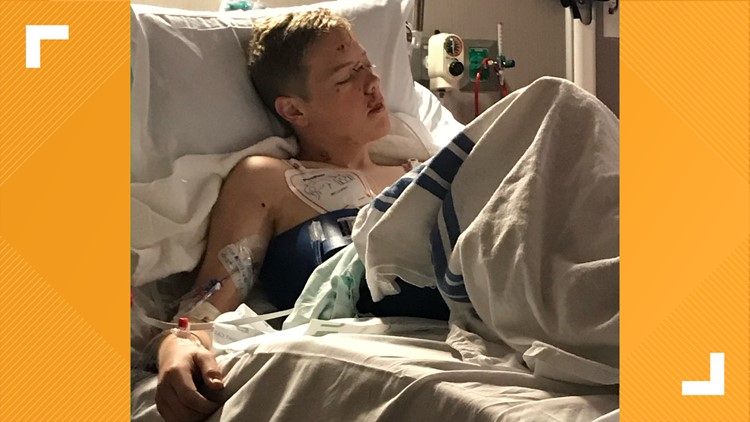A call to 911 from a stranger saving a young North Texan from cardiac arrest highlights the value of learning about cardiopulmonary resuscitation

In 2020, 20-year-old Landon Wyrick was jogging in Wylie when he passed out. A neighbor who knew CPR saved his life.
DALLAS, TX – January 19, 2020 – a date Landon Wyrick can’t ignore.
While doing something ordinary that day, something extraordinary happened.
“I went for a run like I would on any other day,” Wyrick said. “And that’s the last thing I remember.”
Wyrick collapsed while jogging in the Wylie area. A stranger who knew cardiopulmonary resuscitation saw and rushed to help until the doctors arrived.
Three years later, during American Heart Month, Wyrick still can’t believe it: if not for this stranger, he might not be here.
“I think about it every single day,” Wyrick said. “I can’t quite get it in my head.”
What Wyrick didn’t know before running was that he had a rare heart condition hiding under his skin: Wolff-Parkinson-White Syndrome, or WPW for short.
Less than 20,000 people in America are diagnosed with WPW each year.
“It is estimated that one to three out of 1,000 people have WPW, but we don’t know for sure because ECGs are not done for everyone born,” Dr. Manish Assar, a cardiologist-electrophysiologist at Baylor Scott and White Health, told WFAA.
WPW became better known in North Texas recently after TCU quarterback and Heisman finalist Max Duggan revealed he had an ablation to fix the issue.
People with a rare congenital heart defect are born with an extra electrical pathway in the heart. A normal person with sinus rhythm is born with only one.
“This is an arrhythmic condition in which there is an extra connection in the upper and lower chambers of the heart,” Dr. Assar said.
Many patients are asymptomatic, but the most common symptoms of WPW are palpitations or supraventricular tachycardia.
Rarely, less than half a percent of patients a year may experience sudden cardiac arrest with WPW, according to Dr. Assar.
So it was with Wyrick.
Think of the accessory pathway as an extra door for electrical signals to the heart that are not regulated by the AV node.
Sometimes during exercise, these signals can cause the heart to short out and speed up the heartbeat, causing supraventricular tachycardia.
Luckily, the PE teacher noticed that Wyrick fell over while jogging.
“The guy was working on his garage door and he had a cardiopulmonary resuscitation certification. He used it to save my life,” Vayrik said.
According to him, Wyrick was absent for at least ten minutes. The 911 call made by the man’s wife shows how valuable his knowledge of cardiopulmonary resuscitation was.
“He fell down and was unconscious,” the woman said over the phone. “My husband is currently doing chest compressions.”
Wyrick said other people also stopped to help as the operator explained to them what to do next while the ambulance was on its way.
The now 23-year-old said he passed out on Sunday and woke up on Tuesday in the hospital to find out what had happened.
He later met his rescuers when they were honored by the city of Wylie a few weeks later.
Dr. Assar, assigned to Wyrick’s case, ran some tests and found Wyrick had WPW and proceeded to ablate.
Ablation is when a cardiologist uses catheters to travel through veins or arteries into the chambers of the heart to burn or freeze an extra path using radio frequencies.
The path is determined by mapping during the operation. This is a minimally invasive and usually outpatient procedure.
However, Wyrick stayed in the hospital for several days to make sure he was all right and could return home.
He told the WFAA that he did not have an ECG prior to the incident and that this would likely have alerted him to the rare condition. Although most young people do not need an ECG, unless they show any symptoms associated with heart problems.
But Wyrick said that doesn’t mean you can’t benefit from it.
He also said it wouldn’t hurt to know the basics of CPR or how to use an AED – a popular talking point after Buffalo Bills guard Damar Hamlin passed out a few weeks ago during a regular season football game against the Cincinnati Bengals and was brought back to life. on the field.
You never know whose life you can save.
“It was great to know that I was given a second chance. This is divine intervention,” Vayrik said. “I took it very seriously.”
Dallas Press News – Latest News:
Dallas Local News || Fort Worth Local News | Texas State News || Crime and Safety News || National news || Business News || Health News
texasstandard.news contributed to this report.










